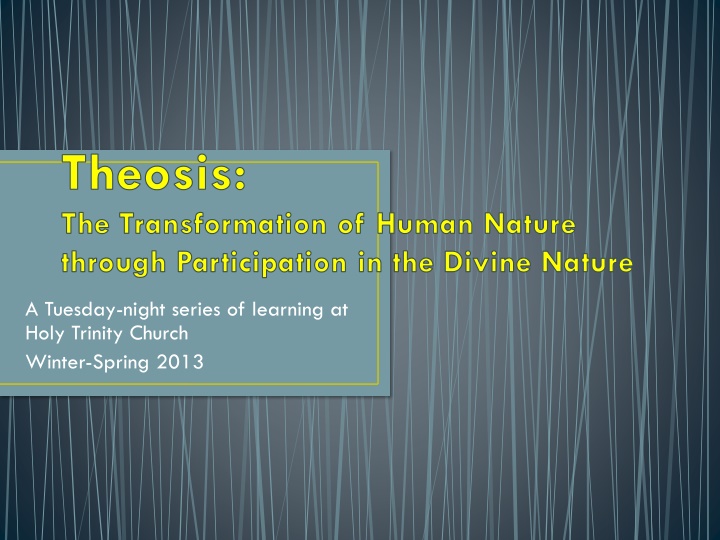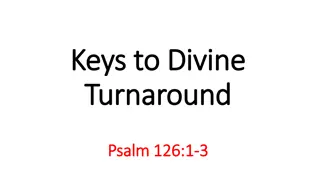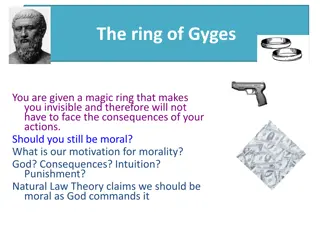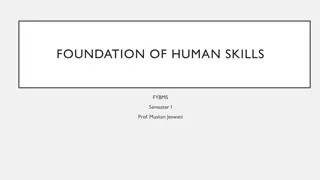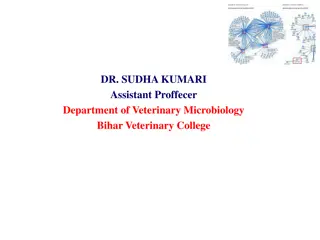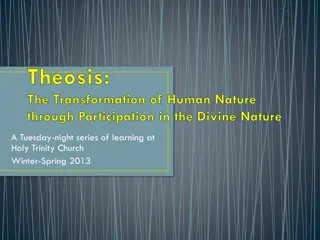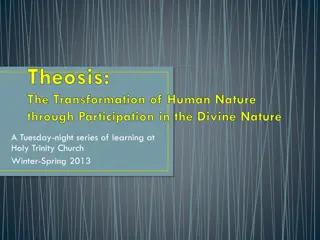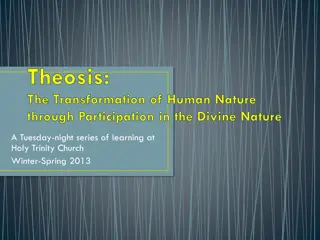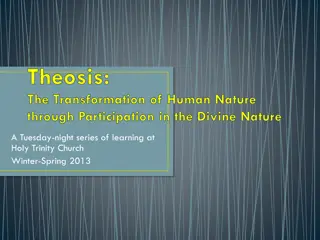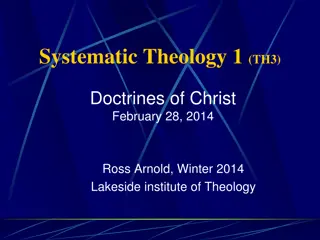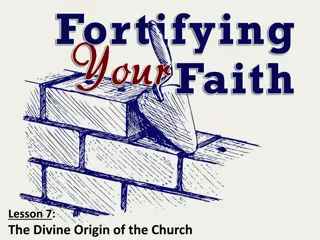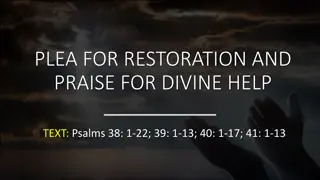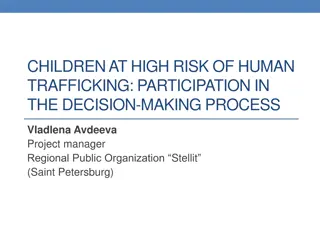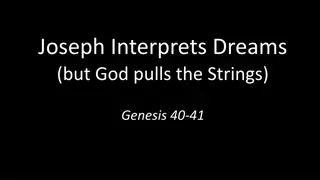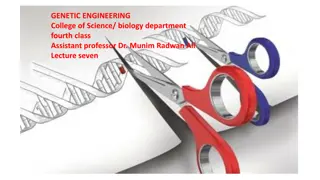Theosis: Transformation of Human Nature through Divine Participation
Explore the profound teachings of Gregory Palamas on theosis, where human nature is transformed through participation in the divine nature. Palamas emphasized the attainability of deification in time through the deified humanity of Christ, highlighting the synergy between divine grace and human effort in the journey towards a divine state. The central symbol of light in Palamas' description of the deified life unveils the spiritual growth and union with God experienced by those who follow the path of deification.
Download Presentation

Please find below an Image/Link to download the presentation.
The content on the website is provided AS IS for your information and personal use only. It may not be sold, licensed, or shared on other websites without obtaining consent from the author.If you encounter any issues during the download, it is possible that the publisher has removed the file from their server.
You are allowed to download the files provided on this website for personal or commercial use, subject to the condition that they are used lawfully. All files are the property of their respective owners.
The content on the website is provided AS IS for your information and personal use only. It may not be sold, licensed, or shared on other websites without obtaining consent from the author.
E N D
Presentation Transcript
Theosis: The Transformation of Human Nature through Participation in the Divine Nature A Tuesday-night series of learning at Holy Trinity Church Winter-Spring 2013
Gregory Palamas (1296-1359) The main defender of monastic hesychasm. He was a monk on Mount Athos. Later elevated to Archbishop of Thessalonica. In 1368 he was canonized by Patriarch of Constantinople. Annual commemoration was set for the Second Sunday of Great Lent, as a sort of second triumph of Orthodoxy ! This in addition to his normal commemoration on Nov. 14th, the anniversary of his death. His teaching on theosis was a synthesis of what preceded and is essentially the modern Orthodox teaching.
Palamite Synthesis Palamas entered into theological controversy with men who saw theosis as only an eternal ideal that is never attained. For Palamas and the monks of Athos, deification was an objective reality, something that is attainable in time because of the deified humanity of Christ. Palamas brought into synthesis the entire patristic teaching on redemption. The doctrine of deification is for Palamas a direct consequence of the historical work of Christ; without him, divine life would have remained inaccessible to man (J. Meyendorff, A Study of Gregory Palamas, p. 159). Redeeming & deifying grace bound to the sacraments.
Synergy According to Palamas Deification is granted as firstfruits of baptism and brought to more perfect realization in pursuing the spiritual life. The result of cooperation ( ) between divine grace and human effort is to raise human beings to a divine state ( ). This cooperation manifests itself in the practice of the commandments. The practice of the commandments is not a condition for grace, but the necessary and free collaboration of human beings with the redeeming action of God (Meyendorff, p. 165). Grace and freedom do not contradict, but presuppose each other.
Synergy According to Palamas Light is the central symbol in Palamas description of the deified life. The ability given us by the Holy Spirit to see God becomes itself light and grows like that which it sees. If it looks at itself, it sees the light; if it looks at the object of its vision, that again is light, and if it looks at the means it employs in seeing, that too is light. It is there that there is union; all that is one, so that he who sees can distinguish neither the means, nor the end, nor the essence, but is only conscious of being light, and of seeing a light distinct from any created thing. (Triads II, 3.36) The saints are transformed by the power of the Holy Spirit they become Spirit and see in Spirit (Against Akindynos IV, 16).
Essence-Energies Distinction The best known part of his teaching. Palamas was a solid adherent of apophatic theology. That is, he affirmed that God is unknowable in his essence. Human beings can never know the divine essence or participate in the divine essence. But human beings can participate in the uncreated energies of God and this participation in the energies is the source of deification. Palamas equated the workings of grace with our participation in the divine energies! This distinction was expressed in very technical language. But for Palamas the reality of salvation was at stake!
Palamas as teacher of Orthodoxy Holy and divine instrument of wisdom, joyful trumpet of theology, with one voice we sing your praises, O Gregory inspired by God. But since you stand now in mind and spirit before the Original Mind, guide our minds to Him, O holy saint, that we may cry out: Rejoice, O preacher of grace! Rejoice, for the darkness is dispelled. Rejoice, for the light has returned. Rejoice, messenger who speaks to us of God s nature. Rejoice, teacher who speaks to us of God s energies. Rejoice, for you have rightly proclaimed God s glory. Rejoice, torch that shows us the Sun. Rejoice, for through you the truth of God has shone forth. Rejoice, O preacher of grace! (from Matins of Second Sunday of Lent)
Theosis after Palamas Publication of the Philokalia ( ) in 1782 by the Athonite monk Nikodimos (a member of the Kolyvades movement) was pivotal event in the modern rediscovery of theosis as a fundamentally Orthodox approach to salvation. The 18th-19thcenturies saw major challenges to Orthodox theology. There was the growing encroachment of Western theology. In Greece there was the growing trend to look to the pre-Christian era for inspiration. The Philokalia served as a buttress against both these trends, in both Greece and Russia.
Theosis after Palamas The most far-reaching impact of the Philokalia revival was not in Greece, but in Russia. The immensely popular book The Way of the Pilgrim is illustrative of the impact the hesychast movement had in Russia among ordinary people. It firmly established the Jesus Prayer as essential part of Orthodox spirituality. Ceaseless prayer, or prayer of the heart, provided a tangible practice available to all, not just to monks. The Philokalia teaching on ceaseless prayer complemented the patristic foundations of mystical theology that we have been examining.
Theosis in Russia St. Seraphim of Sarov (1759- 1833), in whom the uncreated energies of God operated in very visible ways.
Theosis in Russia N. A. Motovilov recorded his encounter with Seraphim. Father Seraphim took me very firmly by the shoulders and said: "We are both in the Spirit of God now, my son. Why don't you look at me?" I replied: "I cannot look, Father, because your eyes are flashing like lightning. Your face has become brighter than the sun, and my eyes ache with pain." Father Seraphim said: "Don't be alarmed! Now you yourself have become as bright as I am. You are now in the fullness of the Spirit of God yourself; otherwise you would not be able to see me as I am. Then, bending his head towards me, he whispered softly in my ear: "Just look, and don't be afraid! The Lord is with us!"
Theosis in Russia After these words I glanced at his face and there came over me an even greater reverent awe. Imagine in the center of the sun, in the dazzling light of its midday rays, the face of a man talking to you. You see the movement of his lips and the changing expression of his eyes, you hear his voice, you feel someone holding your shoulders; yet you do not see his hands, you do not even see yourself or his figure, but only a blinding light spreading far around for several yards and illumining with its glaring sheen both the snow-blanket which covered the forest glade and the snow-flakes which besprinkled me and the great Elder. You can imagine the state I was in!
Theosis in Russia Despite his ascetical life and mystical experiences Seraphim was not elitist in his understanding of prayer and spirituality. He encourages his lay disciple Nicholas Motovilov by insisting that God makes no distinction between the monk and the layperson: The Lord hears the prayers of a simple layperson just as he does a monk s, provided they are both living in true faith and loving God from the depths of their heart. This democratic understanding of the spirituality which accompanies the metaphor/doctrine of deification is a very important of modern Orthodox praxis and ethos.
Theosis in Russia Vladimir Solovyov (1853-1900) was one of the main figures in Russian theology in the 19thcentury. He started out an atheist but found faith as a young man. He taught philosophy at University of Moscow and was known as a poet. Still the slave of the vain world s mind, But beneath rough matter s rind, I ve clearly seen eternal violet, rich royal purple, And felt the warm touch of divine light! Triumphing over death in wisdom s light, Stilling the dream of time from its unyielding flight, Eternal Beloved, your name is held hid by my utmost plight, And forgive my timorous song!
Theosis in Russia Solovyov had a powerful sense of unity: unity of creation under the rule of Wisdom (Sophia), unity of God and man ( Godmanhood ), unity of the church, unity of all Christianity (strong supporter of ecumenism), etc. This deep sense of unity, almost cosmic in scope, is very prominent in modern Orthodox theology. Solovyov saw deification not only as a future hope, but a present reality. Redemption is considered to be a harmonic-evolutionary process, instead of an eschatological break in history; and as a cosmic and collectively human event, instead of an appeal from God aimed at the individual human being (Bercken).
Liturgical Spirituality The annual feasts celebrate the incarnation and redemptive work of Christ in the transformation and deification of humanity and all creation. On Holy Cross Day, the whole creation is set free from corruption. On Christmas, God has come upon earth, and man gone up to heaven. On Theophany, Christ opens the heavens, brings down the divine Spirit, and grants humans a share of incorruption. On the feast of Transfiguration Christ has changed the darkened nature of Adam, and filling it with brightness has made it godlike.
Deification for us? Deification is essential to theology: It draws out the full consequences of the Incarnation of Christ and his redemptive death and resurrection. Deification also depends on a strong understanding of the personalism of God! God is personal, not simply an other-worldly essence. God reaches out to creation, not only in unique events like the Incarnation, but through the continual presence of his energies. Deification helps us see salvation as something more significant than our own individual pass to heaven. It is a powerful metaphor for all God s work and our response to it. It s a metaphor for a reality! Deification is for all, not only for a monastic elite.
Deification for us? Deification of individual believers is a consequence of 2 Peter 1:4 ( become participants of the divine nature ). But it has a bigger scope because of Romans 8:19-23. For the creation waits with eager longing for the revealing of the children of God; for the creation was subjected to futility, not of its own will but by the will of the one who subjected it, in hope that the creation itself will be set free from its bondage to decay and will obtain the freedom of the glory of the children of God. We know that the whole creation has been groaning in labor pains until now; and not only the creation, but we ourselves, who have the first fruits of the Spirit, groan inwardly while we wait for adoption, the redemption of our bodies.
At the center of our being is a point of nothingness which is untouched by sin and by illusion, a point of pure truth, a point or spark which belongs entirely to God, which is never at our disposal, from which God disposes of our lives, which is inaccessible to the fantasies of our own mind or the brutalities of our own will. This little point of nothingness and of absolute poverty is the pure glory of God in us. It is so to speak His name written in us, as our poverty, as our indigence, as our dependence, as our son-ship. It is like a pure diamond, blazing with the invisible light of heaven. It is in everybody, and if we could see it we would see these billions of points of light coming together in the face and blaze of a sun that would make all the darkness and cruelty of life vanish completely . I have no program for this seeing. It is only given. But the gate of heaven is everywhere. (Thomas Merton, Conjectures of a Guilty Bystander)
